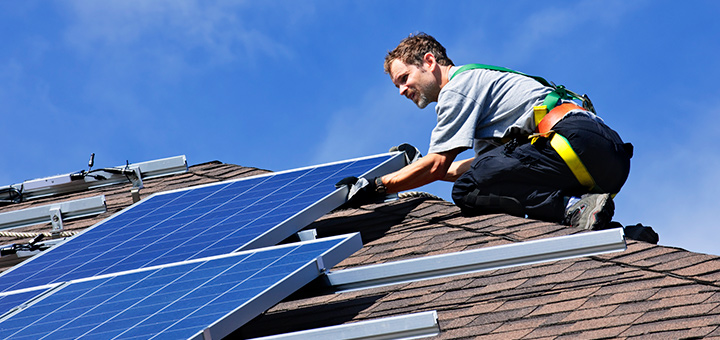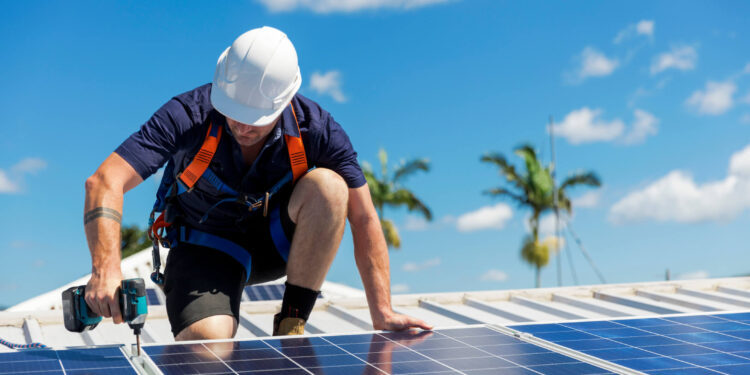The solar panels in your home are an investment that contributes to energy efficiency and long-term savings. But, keeping them running at maximum efficiency isn’t just about aesthetics. It’s also about safety.
Here are some tips for making sure your solar panels are always in top shape:
1. Clean Panels Regularly
Solar panels from reliable providers, like Smart Solar Energy, are a great way to reduce your energy costs and help the environment. But, like any other type of home equipment, they require regular care and cleaning to function correctly.
Dust, pollen, and bird droppings can all build up on solar panels and block sunlight from reaching photovoltaic cells. Such buildup can reduce the amount of electricity the panels generate, and, over time, it can lead to permanent damage. That’s why it’s essential to clean your solar panels regularly. To do this, start by using a soft brush or cloth to remove any loose dirt or debris. For tougher stains, you can use a mild soap or vinegar solution.
Always rinse the panels with clean water afterward to remove any residue. Avoid using pressure washers or harsh chemicals, as these can damage the surface of the panels. With proper care and cleaning, your solar panels will provide years of trouble-free operation.
2. Keep Your Panels Cool
One of the most important things you can do to care for your solar panels is to keep them cool. Solar panels are designed to absorb sunlight, but if they get too hot, they’ll become less efficient. In extreme cases, overheating can damage the panels.
There are several ways to keep your solar panels cool, including the following.
- Shade: If possible, position your solar panels so that they’re partially shaded during the hottest hours of the day. Trees or other structures can do this, too.
- Ventilation: Make sure that your solar panels have good ventilation so that heat can escape. You can accomplish this by installing a fan or opening a window near the panels.
- Cooling Covers: Special covers are available that reflect sunlight and help keep the panels cooler. You should remove these covers when the panel isn’t in use so that it can continue to absorb sunlight.
3. Don’t Let Branches Get Too Close
Trees and other plants can be a great addition to your home, but if they get too close to your solar panels, they can cause problems. Overhanging branches can block sunlight from reaching the panels, and falling leaves can collect on the surface and prevent the panels from working correctly.

To avoid these issues, it’s important to trim any branches that are within 10 feet of your solar panels. It’ll ensure that the panels get the maximum amount of sunlight possible. If you have large trees near your home, you may need to have them trimmed more often to keep the solar panels clear.
4. Use Caution Around The Frame And Edges
One of the most important things you can do for your solar panels is to use caution around the frame and edges. The frame is the part of the panel that holds the glass in place, and the edges are where the glass meets the frame. These areas are susceptible to damage from scratches, nicks, and even impact.
As a result, it’s important to be careful when cleaning or handling your solar panels. When cleaning the panels, use a soft cloth or sponge, and avoid using any harsh chemicals or abrasives. When handling the panels, be sure to hold them by the edges or frame to prevent damaging the glass.
5. Avoid Walking On The Panels
Solar panels are designed to be strong and durable, but they can be damaged if you walk on them. The surface of the panels is fragile, and can be scratched or cracked if you’re not careful. In addition, the weight of a person walking on the panels can damage the frames or unevenly distribute the cells, which can reduce the panels’ efficiency.
To avoid these problems, it’s essential to keep people and animals off of your solar panels. If you need to access the roof for any reason, be sure to use a ladder or any other piece of equipment that’ll distribute your weight evenly. Making sure not to walk on the panels will help extend their lifespan and ensure that they continue to work effectively for many years.
6. Check For Damaged Cabling And Connections
Solar panels are connected to the rest of your home’s electrical system by cables and connections. These connections can become loose or damaged over time, which can cause problems with your solar panels.
It’s essential to check the connections and cables monthly to make sure they’re tight and secure. If you notice any damage, be sure to have it repaired as soon as possible so that your solar panels can continue to work correctly.
7. Be Aware Of Different Seasons And Weather Conditions
Now that you’ve made the switch to solar power, it’s essential to know how to maintain your solar panels so they continue to work efficiently. Depending on where you live, that may mean taking different precautions during different seasons and weather conditions.
For example, if you live in an area with a lot of snowfall in the winter, you’ll need to make sure the panels are clear of any snow or ice buildup. You can do this yourself with a broom or brush, or you can hire a professional cleaning service.
In the summer, it’s essential to keep an eye on the panels for any dirt, dust, or pollen buildup, as this can affect their efficiency. Again, you can clean them yourself or hire a professional service. And, no matter what time of year it is, it’s always a good idea to check your panels regularly for any loose connections or damaged parts.
8. Monitor Your Usage VS Your Solar Production
It’s essential to monitor your usage and production levels. Here are a few tips to help you get started to get the most out of your investment.
First, take a look at your energy usage over a month. It’ll give you a good idea of when you use the most energy and how much you could potentially save by using solar power.
Next, check your solar production levels. It’ll tell you how much power your panels are generating. If you find that your production is lower than expected, there are a few things you can do to troubleshoot the issue.
Finally, keep an eye on both your usage and production levels over time. It will help you identify any trends and make changes accordingly.
9. Check Your Electrical System
Solar panels are a great way to save money, and they’re also good for the environment. However, before you purchase solar panels, it’s essential to make sure that your home’s electrical system is up to the task.
First, always have a qualified electrician check your electrical system before connecting any new solar panels. It’ll ensure that your system can handle the additional power load.
Second, be sure to have your solar panels professionally cleaned and inspected regularly. Dust, dirt, and leaves can build up on the panels and reduce their efficiency.
Third, if you live in an area with heavy snowfall, you’ll need to take special care to keep your solar panels clear of snow and ice. Heavy accumulations can damage the panels or cause them to become detached from your roof.
10. Test Batteries If You Have Them
If you live in an area with a lot of power outages, you may want to consider investing in batteries for your solar panels. Batteries can store extra power so that you have it available when the grid goes down. However, batteries are a significant investment, so be sure to do your research before making a purchase.
Additionally, it’s essential to test your batteries regularly to ensure that they’re working correctly. Batteries can degrade over time, so it’s critical to keep an eye on their performance and replace them as needed.
11. Keep The Inverter Up To Date
One of the most critical components of a solar panel system is the inverter. The inverter converts the DC power produced by the solar panels into AC power, which you can then use to run your home’s appliances and lights.
If your inverter is outdated, it can significantly reduce the efficiency of your solar panel system. Luckily, there are some easy ways to keep your inverter up to date.
First, make sure to regularly check the manufacturer’s website for updates and firmware releases.
Second, if you have an Internet-connected inverter, you can set it up to automatically receive updates.
Finally, if you hire a professional solar installation company, they can typically provide you with inverter maintenance and update services.
12. Upgrade Damaged Panels
The most vital task in this list is to regularly inspect your panels for damage, and upgrade or replace any damaged panels. Solar panels are made of tough, durable materials, but they can still be damaged by high winds, hail, or debris. If you notice any cracks or missing pieces, it’s crucial to take action right away to avoid further damage.
Replacing a damaged panel is usually a simple process. However, if you’re not comfortable doing it yourself, you can always hire a professional installer. Upgrading damaged panels will help ensure that your solar system continues to run smoothly and efficiently.
Takeaway
Solar power is a great way to save money and reduce your carbon footprint. However, once you have solar panels installed, be sure to maintain them to ensure optimal performance regularly. By following the tips above, you can enjoy all the benefits of solar power without any headaches.





